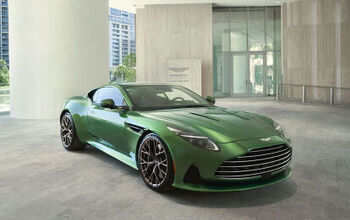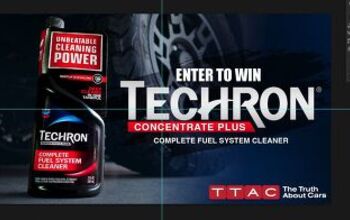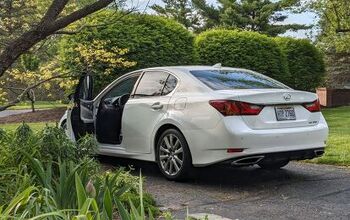General Motors Death Watch 110: Will Opelization Save Saturn From GM's Black Hole?
Our first car was a navy blue Opel Kadett. My father was off to sea; my mother took us on an inaugural daytrip. When my father returned to the Norwegian mainland, he dismissed the car as too small and upgraded to an Opel Kapitän. This was followed at short intervals by an Opel Rekord and an Opel Admiral. (The hierarchical naming scheme of Opel marketing in the 60s-70s was pretty obvious.) I’m sure my father would have moved to a Senator with time– but he was ready for a Mercedes. Once he’d switched allegiances, he never looked back.
They were good cars, the Opels, but they were also ”’tweeners”: the brand you bought until you made enough money to move on to something better. Then as now, Teutonic carmakers offer such a wealth of quality choices that it’s hard for Opel to stand out. For the last two decades it’s been the ”we’re here too” brand: a low to middle market alternative to higher-priced, better-regarded imports and homegrown ”names;” roughly akin to Chevrolet’s current position in the U.S.
And now GM has decided to populate its ailing Saturn brand with Opels, both platform derivatives (Aura) and outright imports (Astra). The American brand born as GM’s ”import fighter” is down to relying on imported European design, technology and production for its salvation.
The irony is delicious, the choice of donor inauspicious. Although Opel is currently undergoing an extensive product redevelopment program, the Euro-brand’s tweener mainstream products are a stretch as pinch hitters for a quirky niche player.
It’s hard to tell what GM has on its mind these days. They’re building Opel-platformed Saturns, Vauxhalls, Holdens, Chevrolets and Saabs (designed in Germany, sometimes rejigged and rebadged as Cadillacs). While platform sharing and international parts commonality shouldn’t be an impediment to shrewd, sustainable and distinctive branding, you wouldn’t think it from looking at the products coming from GM’s mashup of mid-market models. Can Saturn carve out a name for itself deploying generic German motors? Not likely.
There’s a Black Hole hovering over RenCen. This irresistible vortex devours any automotive brand with a definable identity, pulls it through the Event Horizon, and spits it back out again, bland and denuded. Every brand-specific selling point and distinguishing feature is lost, replaced by variations on the badge slapped to the hoods of identical look-and-feel automobiles. Saturn disappeared into that time – space distortion a long time ago. The new Aura may be a great car, but it’s not a great Saturn.
Hang on; what’s one of them, then? No one’s really sure anymore.
That such a fate should befall Saturn is tragic. Like Lexus, the brand was born an empty slate. Within a few short years, Saturn’s plastic-panelled vehicles, no-haggle pricing and customer-focused dealers built an intensely loyal following. While Pontiac stopped building excitement, Cadillac disappeared into a fug of mediocrity and Oldsmobile vanished, Saturn buyers stood by their brand. They knew they were a different kind of customer for a different kind of company.
This description once applied to Saab buyers. Talk about bad karma; The General bought the brand about the same time they started Saturn. As the import fighter found its inner quirk, the quirky Swedish brand born of fighters was stripped of its mojo. The General tried to turn Saab into a cut-price luxury marque (!), alienating the brand’s core customers. At the same time, GM’s mandarins gradually starved Saturn of product and marketing resources, until the brand’s soul was gone.
Which leaves GM with not one but two formerly distinctive brands that have lost their direction. The General is now talking about brand distinction, even as it begins badge-engineering on a global basis.
Too late. If GM had begun nurturing its divisions’ branding when it mattered, back in the late ’80’s, it would now have a lineup of companies serving a palette of consumer needs. Instead it has a vortex of brands pretending to be different, stacked up in the middle of each segment.
Saturn sits in a particularly tepid part of the goulash. Back when they began, Saturn dealers’ honesty, stress-free service and customer focus was a big deal. In these post-Lexus days of customer CSI’s and J.D. Power ratings, when Saturn hasn’t sold itself as the car customer’s best friend for over a decade, the brand’s [unstated] promise of warm fuzzies is no big thing. When they ditched plastic panels, product differentiation died. Which left Saturn with… nothing.
Take it from someone who’s grown up around Opels, Opelization will not save Saturn. Opel has no glamor to bestow upon Saturn; its geist is middle-of-the-road. This, of course, will not prevent The General from throwing its reserves at another researched-to-death brand melée. But Saturn’s customers have already moved on, as my father did with his Opels. And they’re not looking back.
Brand strategist and conceptualizer. Working with communicating premium brands for manufacturers around the world.
More by Stein X Leikanger
Latest Car Reviews
Read moreLatest Product Reviews
Read moreRecent Comments
- Oberkanone Nope. No interest.
- SilverCoupe Tim, you don't always watch F1 as you don't want to lose sleep? But these races are great for putting one to sleep!I kid (sort of). I DVR them, I watch them, I fast forward a lot. It was great to see Lando win one, I've been a fan of McLaren since their heyday in CanAm in the late '60's.
- Cprescott The problem with this fable by the FTC is:(1) shipping of all kinds was hindered at ports because of COVID related issues;(2) The President shafted the Saudis by insulting them with a fist bump that torqued them off to no end;(3) Saudis announced unilateral production cuts repeatedly during this President's tenure even as he begged to get them to produce more;(4) We were told that we had record domestic production so that would have lowered prices due to increased supply(5) The President emptied the strategic petroleum reserve to the lowest point since the 1980's due to number 3 and then sold much of that to China.We have repeatedly been told that documents and emails are Russian disinformation so why now are we to believe this?
- Ollicat Another Biden attempt to say, "Look over there!"
- Kjhkjlhkjhkljh kljhjkhjklhkjh Who cares. Price of gas is not the issue. spending an extra 100$ a month over 4 tanks of gas is not the issue.this a political scam to distract really dumb people from the real issue. if rent and house payments were not up by 50% to as high as 150% higher in a ton of locations, then paying an extra 100$ in gas would be annoying but not really an issue. But the real-estate market with hedge fund investors, power-relator groups bought a ton of houses and flipped them into rentals and jacked up the rates uplifting the costs on everything else. and ironically no-one seems to be in any hurry to build more houses to bring those costs down because supply and demand means keeping less houses available to charge as much as you want. It is also not the issue as a secondary issue is child care costs and medical... again 100$ extra per month in gas is *nothing* compared to 800$ a month in ''child care'' and 300$ per visit to the doctor office, 300$ for a procedure less dentist trip..

































Comments
Join the conversation
Stein, The disconnect I see in all of these "Opel can't save Saturn" opinions is this: the vast majority of US consumers do not know or care one whit about Opel and its "brand cachet". The fact is, Saturn has a compeling line of cars for the first time since its inception. They "appear" different from other stablemates, have an interesting and consistent stying language, and even offer a few alternatives (some pending) for the Green crowd to induce warm fuzzies. OK, you grew up around Opel and understand it to be the Chevrolet of Europe. I didn't grow up with Opel, but I do know them fairly well (once coveting a Calibre), and still have some (perhaps misguided) sense that Opel is at minimum a reasonably high quality alternative to VW. Not a bad comparison in my mind, despite VW's recent US bumblings. Badge engineering on a global scale makes a ton of sense for GM, and gives us consumers truly unique product. I'm betting Opel WILL save Saturn, and by extension, Saturn will show that GM can build cars that people actualy want. And just think, when those Saturn folks are ready to upgrade, as your father did, there's a Buick or Cadillac dealer just waiting to help them...
for years enthusiasts cried to gm "Bring in some of your imports!!" Now they're doing it and y'all are gonna complain about that TOO?